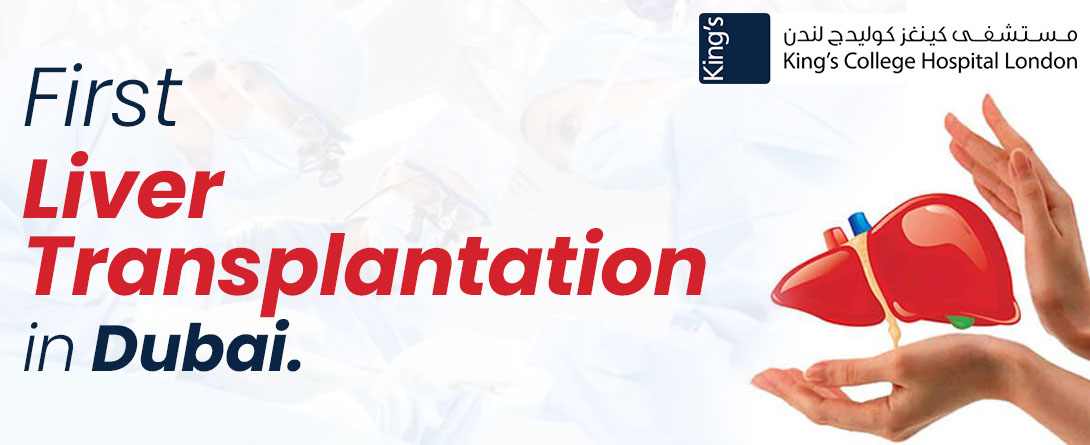Our Liver Team at King’s College Hospital performed the first liver transplantation in the Emirate of Dubai. The fortunate patient who benefitted from this surgery was a 38-year-old lady who was suffering from cirrhosis and liver failure. She presented six months ago with yellowish discoloration of the eyes (jaundice) and swelling of her feet and belly (ascites). She was evaluated by Dr. Kaiser Raja, Consultant in Liver Diseases and Director of Transplant Hepatology at King’s College Hospital, Dubai and was diagnosed to have an uncommon condition of the liver known as autoimmune hepatitis, in which the body’s immune system damages one’s own liver. Unfortunately, in her case, by the time she developed symptoms of liver disease, she had already developed liver cirrhosis with features of liver failure. Medications were tried but were not successful. It was therefore decided that the best treatment for her would be a liver transplant. She underwent a comprehensive pre-transplant evaluation to make sure that she had no other ailments, and that transplantation could be safely performed on her. She underwent a liver transplantation on 29th November 2023. The donated organ was from a deceased donor whose family graciously agreed for organ donation.
The surgery was performed by a team of transplant surgeons led by Dr. Parthiban Srinivasan who is the Director of Liver Transplantation at King’s College Hospital London in UK and Dr. Rakesh Rai, transplant surgeon at King’s College Hospital in Dubai. Liver transplantation is a complex abdominal surgery that involves complete removal of the diseased liver followed by implantation of a healthy liver. After the surgery, the patient was closely monitored in the liver intensive care unit by liver intensivists (Dr. Mohammed Abdulraheem, Dr. Nageswar Bandla and Dr. Desh Deepak) and hepatologists (Dr. Kaiser Raja and Dr. Farooq Khan). Immediate post-transplant care involves close monitoring of all organ functions, prevention of infections and administration of immunosuppressant mediations to ensure that the new liver was not rejected by the patient’s body. Once it was ascertained that the new liver had started functioning and that all other organ systems were also functioning optimally, the patient was moved from the intensive care unit to a high dependency unit. She was discharged ten days after the surgery in very good health. She continues to follow with Dr. Kaiser in the liver clinic and is doing very well. The patient will require lifelong medications to prevent rejection. After the first 6 months, the chance of rejection is usually quite low and patients need only a small dose of medications. Lifelong follow-up and astute monitoring of immunosuppressant drug usage is needed so that the transplanted liver keeps working well and patient does not develop long-term medication related adverse effects. With modern immunosuppressant drugs and proper long-term medical care, liver transplant recipients generally have a very good survival with 90% patients doing well at 1 year and 75% patients surviving more than 10 years.


 https://mediaoffice.ae/en/news/2023/December/20-12/Dubai-Health-Authority-announces-first-successful-liver-transplant-surgery-in-the-emirate
https://mediaoffice.ae/en/news/2023/December/20-12/Dubai-Health-Authority-announces-first-successful-liver-transplant-surgery-in-the-emirate
 https://gulfnews.com/uae/health/first-ever-liver-transplant-in-dubai-saves-38-year-old-womans-life-1.100038589
https://gulfnews.com/uae/health/first-ever-liver-transplant-in-dubai-saves-38-year-old-womans-life-1.100038589 https://kingscollegehospitaldubai.com/service/liver-transplant-centre
https://kingscollegehospitaldubai.com/service/liver-transplant-centre https://www.khaleejtimes.com/uae/dubais-first-ever-liver-transplant-saves-38-year-old-womans-life
https://www.khaleejtimes.com/uae/dubais-first-ever-liver-transplant-saves-38-year-old-womans-life Book Online Consultation
Book Online Consultation